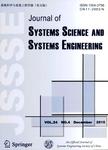A ONE-STOP LOGISTIC SERVICES FRAMEWORK SUPPORTING GLOBAL SUPPLY CHAIN COLLABORATION
A ONE-STOP LOGISTIC SERVICES FRAMEWORK SUPPORTING GLOBAL SUPPLY CHAIN COLLABORATION作者机构:Department of Industrial Engineering and Engineering Management National Tsing Hua University Hsinchu Taiwan China Department of Management Science National Chiao Tung University Taiwan China Technology Center for Service Industries Industrial Technology Research Institute Taiwan China
出 版 物:《Journal of Systems Science and Systems Engineering》 (系统科学与系统工程学报(英文版))
年 卷 期:2016年第25卷第2期
页 面:229-253页
核心收录:
学科分类:0810[工学-信息与通信工程] 1205[管理学-图书情报与档案管理] 07[理学] 08[工学] 0802[工学-机械工程] 0811[工学-控制科学与工程] 0812[工学-计算机科学与技术(可授工学、理学学位)]
基 金:supported by the Ministry of Science and Technology the Industrial Technology Research Institute (ITRI) in Taiwan, China
主 题:One-stop logistic services logistic management supply chain management system dynamics modeling
摘 要:A global enterprise must continuously improve the efficiency of logistic operations between supply chain collaborators. Integrating logistic services, resources, and necessary information flows in the supply chain to ensure efficiency and efficacy is critically important to these companies. Global logistic service companies face challenges from their clients to provide logistic services that are cost effective, accurate, and seamlessly integrate material, information and cash flows. In this research, an improved framework for one-stop logistic services is systematically designed, analyzed, and evaluated. The one-stop logistic service framework, defmed in four models, is developed to provide enterprises with integrated and comprehensive services within the global supply chain context. The levels of service importance are assessed using a four categories questionnaire. This research provides a case study of the implementation of one-stop logistic services in the distribution industry and demonstrates the framework operating under different demand conditions. Finally, system dynamics causal evaluation is used to evaluate the advantages of the logistic service framework.



